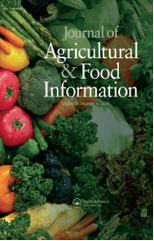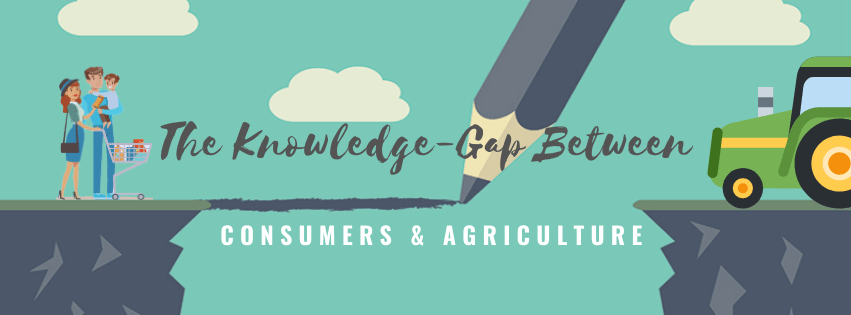As the trend towards urbanization continues, the Canadian agriculture industry faces increasing concerns about the disconnect between consumers and food production. In 2016, only 19% of Canadians lived in rural communities, dropping from 46% over the past one hundred years. The disconnect from agriculture has caused many consumers to become increasingly interested in the origins of their food. Although much credible information about agricultural production exists, it can be difficult for consumers to access, especially if it’s published in academic journals that require subscriptions. The mere convenience of social media as an information source has led, unsurprisingly, to 58% of Canadians accessing their news and current events online.
Unfortunately, a lack of knowledge can lead to consumer distrust, and in a commonly scrutinized industry like agriculture, the knowledge-gap must be addressed. Before steps can be taken to shrink this knowledge-gap, we must identify the agricultural topics that consumers are least knowledgeable about. To identify these key areas, we surveyed 700 Canadians on their knowledge and familiarity with topics including crop protection products and application, organic farming, animal production, and plant breeding techniques.
Results from the survey reveal that consumers lack basic knowledge in most areas of agricultural production. Interestingly it appears that many consumers have a low understanding of some topics which they believe they are familiar with. For example, 74%, 69%, and 83% of participants indicate being familiar with the terms herbicide, fungicide, and insecticide, respectively. Yet, when asked if chemicals used today are more toxic than those used in the past, 32% thought that chemicals are more toxic today than 25 years ago and 25% were unsure. Results were similar with respect to 50 years ago. In fact, chemicals used today are more environmentally benign than those used 25 and 50 years ago. In addition, 28% of participants believe that pure chemical (100% concentrate) is sprayed on crops when in reality chemical concentrate is mixed with high volumes of water before application.

While participants reveal a lack of knowledge about chemical applications in conventional agriculture, the misconception about its use in organic production is even more revealing. While 81% of participants are familiar with the term organic farming, 88% believe that the number of chemical compounds registered for organic production lies between 0-25. Of these responses, 61% think the number lies between 0-5, and 36% believe no chemical compounds are approved. However, at the time of the survey, 140 compounds were registered for use in organic production (only 0.5% of participants identified the correct range).

One commonly criticized aspect of agricultural production is its environmental effects. The environmental impact of agriculture in Canada has been improving for decades due to the adoption of more sustainable practices such as the shift away from summerfallow and towards conservation tillage practices. These practices help to reduce soil erosion, greenhouse gas emissions, and fossil fuel use. Yet, 32% of survey participants believe that continuous, annual cropping leads more to soil erosion than summerfallow, and 28% do not know or believe there is no difference. Additionally, 47% of participants believe that soil erosion has increased over the last 30 years and 27% do not know. Yet, Agriculture and Agri-Food Canada’s soil erosion indicator reports a 19% decrease in soil erosion. Unfortunately, the majority of Canadians have not been informed of Canadian agriculture’s movements towards environmentally-beneficial practices.

Animal production emerged as the area of agriculture participants were the most familiar with. Although a lack of knowledge still exists, most participants were able to correctly answer questions about the standards required for animal care, the use of antibiotics in animal production, livestock living conditions, and welfare measures. They were also quite familiar with popular terms including “hormone-free” and “certified-humane”. It is possible that consumers are more familiar with these terms due to the livestock industry’s efforts to improve transparency in response to criticism from animal welfare activists.
Overall, the survey results show that Canadians are still underinformed about basic aspects of agricultural production. As consumers continue to be disconnected from rural areas, the industry must find ways to improve communication and transparency. This improved communication is necessary for the protection of technologies and practices most valuable to Canadian farming operations. Additionally, consumer opinion is influential to policies and regulations. Improving the relationship between consumers and agricultural production through honest and open communication will help to ensure that all Canadians, from consumers to producers, enjoy the benefits of safe, sustainable, agricultural production.
To check out the full article titled “Canadian Consumer Insights on Agriculture: Addressing the Knowledge-Gap”, click here.
Chelsea Sutherland, Cassidy Sim, Savannah Gleim & Stuart J. Smyth (2020). Canadian Consumer Insights on Agriculture: Addressing the Knowledge-Gap, Journal of Agricultural & Food Information.
DOI: 10.1080/10496505.2020.1724114




Congratulations on a well done survey. AND a few random thoughts. First if we could only get the advertising agencies to stop portraying farmers with a 1949 pickup and a 35 hp old tractor. Secondly how do we get the press with the big city news papers to adequately tell the story of agriculture?
Your survey on soil loss in my opinion missed a major element—urbanization is a major cause of good agricultural land, and we cannot get it back.
Have you read “Food 5.0” How We Feed The Future. by Rob Saik a good thought provoking read.
Thank you for your comments. I agree, updating the traditional images of agriculture is a major piece of the puzzle when it comes to connecting with consumers. Somehow we need to show that the incredible modernization of agriculture today is worth talking about! Your thought on urbanization causing a loss of good agricultural land is an interesting one, thank you for bringing that up. We may have to incorporate some of these ideas into future similar studies.